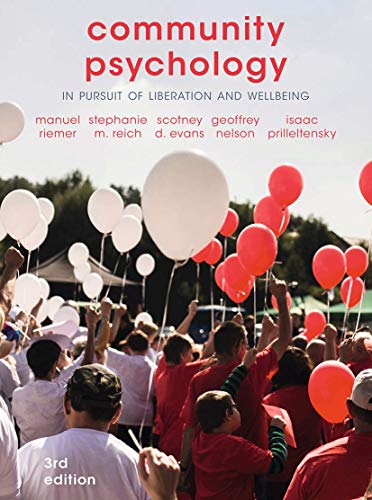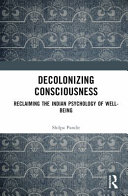Community Psychology In Pursuit of Liberation and Well Being 3rd Edition by Manuel Riemer, Stephanie Reich, Scotney Evans, Geoffrey Nelson, Isaac Prilleltensky ISBN 9781137464101 1137464100
$50.00 Original price was: $50.00.$25.00Current price is: $25.00.
Community Psychology In Pursuit of Liberation and Well Being 3rd Edition by Manuel Riemer, Stephanie Reich, Scotney Evans, Geoffrey Nelson, Isaac Prilleltensky – Ebook PDF Instant Download/Delivery: 9781137464101 ,1137464100
Full download Community Psychology In Pursuit of Liberation and Well Being 3rd Edition after payment

Product details:
ISBN 10: 1137464100
ISBN 13: 9781137464101
Author: Manuel Riemer, Stephanie Reich, Scotney Evans, Geoffrey Nelson, Isaac Prilleltensky
Community Psychology In Pursuit of Liberation and Well Being 3rd Edition Table of contents:
I FRAMING COMMUNITY PSYCHOLOGY:HISTORY, VALUES, AND KEY CONCEPTS
1 COMMUNITY PSYCHOLOGY RESEARCH AND ACTION FOR SOCIALCHANGE AND WELLBEING
Warm-up Questions
Learning Objectives
In this chapter you will learn about
Introduction to Community Psychology
Three Illustrative Social Issues
Social Issue I: Immigration
Problem Definition and Guiding Principles
Levels of Analysis
Approach to Addressing Social Issues, Types of Intervention and the Roleof the Professional
Research
Social Issue II: Homelessness and Stable Housing
Problem Definition and Guiding Principles
Levels of Analysis
Approach to Addressing Social Issues, Types of Intervention, and the Roleof the Professional
Research
Social Issue III: Environmental Sustainability
Problem Definition and Guiding Principles
Levels of Analysis
Approach to Addressing Social Issues, Types of Intervention and the Roleof the Professional
Research
Your Journey
Key Terms
Resources
General Community Psychology
Books
Websites
Journals and Newsletters
Homelessness
Books and Articles
Websites
Immigration
Book Chapters and Articles
Websites
Climate Change and Environmental Sustainability
Books
Book Chapters
Websites
2 HIGHLIGHTS OF THE HISTORY OF COMMUNITY PSYCHOLOGY
Warm-up Questions
Learning Objectives
In this chapter you will learn about
Why Study History?
Important Issues and Allied Disciplines
Mental Illness and Community Mental Health
Mental Health and Self-Help
Social Justice and Civil Rights
Three Social Issues from the Start
Formalization and Growth
National and International Organizations and Journals
Diversity of Perspectives
Language and Influence
Chapter Summary
Key Terms
Resources
Additional Readings on CP by Region
Global
Africa
Asia
Australia and New Zealand
Europe
Latin America
North America
Online Resources for CP internationally:
Africa
US and Canada
Europe
Latin America
Asia
Australia and New Zealand
3 COMMUNITY PSYCHOLOGY COMMUNITY PSYCHOLOGY
Warm-up Questions
Learning Objectives
In this chapter you will learn about
Values and Vision in Community Psychology
Values for a Value-Driven Science and Practice
Vision
Context
Needs
Action
Interdependence of Visions, Values, Context and Action
Values in Context and Practice
Community Psychology Values
Values for Personal Wellbeing
Values for Relational Wellbeing
Values for Collective Wellbeing
Pursuit of Wellbeing
The Synergy of Values
Social Justice
Chapter Summary
Key Terms
Resources
4 POWER, EMPOWERMENT, AND DEPOWERMENT
Warm-up Questions
Learning Objectives
In this chapter you will learn about
Opening Thinking: Power Dynamics in Daily Activities
The Power of Thinking about Power
What Is Power?
Power in Context
The Multidimensional Nature of Power
Power Cube
Power and Community Work
Privilege/Overpowerment
Zero-Sum (Finite) Versus Zero-Plus (Infinite) Power
Empowerment
Empowerment and Resilience
Transconceptual Model of Empowerment and Resilience
Mattering
Social Capital
Individual and Community Social Capital
Bridging and Bonding Capital
Power and Wellbeing
Recognizing Power as Privilege
Inequality at a System Level
Community Psychology and Power Structures
Social Justice Needs to Question How Power is Allocated
Chapter Summary
Key Terms
Resources
5 THINKING LIKE A SYSTEM ECOLOGY AND COMPLEXITY IN A GLOBALIZED WORLD
Warm-up Questions
Learning Objectives
In this chapter you will learn about
Introduction to Systems Thinking
Systems Theory and Systems Thinking
The Ecological Metaphor
What is the Ecological Metaphor?
Ecological Principles
Interdependence
Cycling of Resources
Adaptation
Succession
Why is the Ecological Metaphor Important?
Perceived Environments
Objective Characteristics of Environments
Transactional Approaches
What Is the Value Base of the Ecological Metaphor?
How Can the Ecological Metaphor Be Implemented?
What Are the Limitations of the Ecological Metaphor?
Complexity in a Globalized World
Neoliberalism
Globalization
Chapter Summary
Key Terms
Resources
6 PREVENTION, PROMOTION, AND SOCIAL CHANGE
Warm-up Questions
Learning Objectives
In this chapter you will learn about
Going Upstream
What are Prevention and Promotion?
Prevention
Universal Strategies for Preventing Homelessness
Selective Strategies for Preventing Homelessness
Indicated Strategies for Preventing Homelessness
Health Promotion
The Importance of Prevention and Promotion
The Value Base of Prevention and Promotion
Development of Prevention and Promotion Efforts
The Challenge of Dissemination and Adoption
Implementing Prevention and Promotion
Risk Factors, Protective Factors, and High-Risk Approaches to Prevention
What are the Characteristics of Effective Prevention andPromotion Programming?
The Limits of Prevention and Promotion
The Challenge of Dissemination and Adoption
Balancing Rigor with Community Participation
Focus on Social or Structural Injustices
Social Change
Problem Definition: Framing the Issue
Types of Change
What is Transformation Really?
Chapter Summary
Key Terms
Resources
Prevention Journals and Websites
7 COMMUNITY, CONNECTION, AND PARTICIPATION
Warm-up Questions
Learning Objectives
In this chapter you will learn about
What is a Community?
Sense of Community
What are the Limitations of Sense of Community?
Inclusion
What is Inclusion?
Social Capital
Citizen Participation
Collective efficacy
Social Networks
Community Capacity
Chapter Summary
Key Terms
Resources
II COMMUNITY PSYCHOLOGY INTERVENTIONS
Introduction to Part II
8 AN OVERVIEW OF COMMUNITYPSYCHOLOGY INTERVENTIONS
Warm-up Questions
Learning Objectives
In this chapter you will learn about
The Community Psychologist as an Agent of Social Change:Connecting the Personal, Political, and Prof
The Making of a Community Psychologist
Can I Make a Living Disrupting the Status Quo? Community Psychologists as Insidersand Outsiders
The Community Psychologist as a Professional
The Focus of Community Psychology Interventions
Aims of Community Psychology interventions
Framing the Issue
Intervention process
Roles for Community Psychologists
Settings for Interventions
Community Psychology Begins at Home
Human Services
Alternative Settings
Settings for Social Change
Chapter Summary
Key Terms
Resources
Websites in Community Psychology
Relevant Journals
Books
9 SOCIAL INTERVENTIONS
Warm-up Questions
Learning Objectives
In this chapter you will learn about
The Social Determinants of Wellbeing
What Are Social Interventions?
In the Belly of the Beast
Challenging the Status Quo
The Value-base of Social Interventions
The Importance of Social Interventions
The Role of Community Psychologists Working in Government
Promoting Equality
Protecting National Resources and the Public Sector
Strengths and Limitations of Government Social Interventions
Dilemmas Faced by Community Psychologists Workingin Government
The Role of Community Psychologists in Social Movementsand Non-Government Organizations
Roots of Social Movements
Suffering and Deprivation
Consciousness-raising
Congealing Events
Political Opportunities
Preparing for Action
Multiple Sources of Support
Congruence of Interests
Communications Network
Organizational Effectiveness
Resource Mobilization
Collective Action Strategies
Recruitment – Numbers Count
Media Campaigns
Coalitions
Lobbying and Political Influence
Protest and Non-violent Civil Disobedience
Strengths and Limitations of Social Movement Organizationsand Non-government Organizations
Strengths
Transformative
Participatory
Integrative
Limitations
Unaccountable
Contradictory
Transitory
Insular and Self-defeating
Indifferent to Diversity
Dilemmas Faced by Community Psychologists Workingin Social Movement Organizations and Non-government
Chapter Summary
Key Terms
Resources
10 ORGANIZATIONAL ANDCOMMUNITY INTERVENTIONS
Warm-up Questions
Learning Objectives
In this chapter you will learn about
Introduction to Organizational and Community Interventions
Civil Society Organizations
What Are Organizational Interventions?
Organizational Empowerment (OE)
Extraorganizational Empowerment
Services or Social Change?
Critical Community Practice
Interorganizational Empowerment
Intraorganizational Empowerment
Roles of Community Psychologists Working in Organizations
Promote an Empowering and Empowered Organization
Internal and External Agents of Change
Emotional Competencies and Their Transformational Potential
Steps for Organizational Change
Strengths and Limitations of Organizational Interventions
Community Empowerment
Community Building
Coalition Building
Comprehensive Community Initiatives (CCIs)
Collective Impact
Community Organizing
The Roles of Community Psychologists Working in Communities
Partnership Maker
Change Maker
Knowledge Maker
Strengths and Limitations of Community Interventions
Dilemmas Faced by Community Psychologists Workingin Organizations and Communities
Chapter Summary
Key Terms
Resources
11 INDIVIDUAL AND SMALL GROUP INTERVENTIONS
Warm-up Questions
Learning Objectives
In this chapter you will learn about
The Role of Small Group and Individual Interventionsin Community Psychology
What Are Individual and Small Group Interventions?
Values Supporting Work with Individuals and Small Groups
The Importance of Individual and Small Group Interventions
Promotion of Wellbeing and Liberation
Pre-Contemplation
Contemplation
Preparation
Action
Maintenance
Evaluation
Follow-up
The Roles of Community Psychologists Working in Individualand Small Group Interventions
Inclusive Host
Visionary
Asset Seeker
Listener and Sense Maker
Unique Solution Finder
Evaluator
Implementer
Trendsetter
Strengths and Limitations of Individual and Small GroupInterventions
Dilemmas Faced by Community Psychologists Workingwith Individuals and Small Groups
Chapter Summary
Key terms
Resources
Working with Individuals
Working with Groups
III COMMUNITY ENGAGED RESEARCH
Introduction to Part III
12 FRAMING COMMUNITY-ENGAGED RESEARCH
Warm-up Questions
Learning Objectives
In this chapter you will learn about
The Importance of Context and Challenging Assumptions
Reflections on Research Paradigms
Paradigmatic Questions
Major Research Paradigms
Positivist/Post-Positivist Paradigm
Constructivist/Interpretative Paradigm
Transformative/Emancipatory Paradigm
Postcolonial/Indigenous Research Paradigm
Beyond the Major Paradigms
Purpose of Knowledge in Society
Definition of Community-engaged Research
General Understanding of Research
Generation of Knowledge
Data Sources
Systematic Process
Community-engaged Research
Key Research Terms
Chapter Summary
Key Terms
Resources
Books
Articles and Book Chapters
13 THE RESEARCH CYCLE
Warm-up Questions
Learning Objectives
In this chapter you will learn about
Overview of the Research Cycle
I. Initial Engagement and Focusing
Engaging with Community in Research
Participation and Community Control
Creating Optimal Conditions for Engagement
Framing and Focusing the Research
II. Design
Matching Design with Research Objectives
Technical Knowledge
Practical Knowledge
Emancipatory Knowledge
Specific Design Consideration for Community Psychology
Applied
Contextual
Relational
Developmental/Change
Respect for Diversity
Additional Design Considerations
Utility
Credibility
Ethics
Power
Feasibility
Concluding Thoughts About Design
III. Research Team
Roles
Power Issues in Teams
IV. Participant Recruitment and Data Collection
Ethics
Power
Reflection
V. Analysis and Interpretation
VI. Knowledge Mobilization
Chapter Summary
Key Terms
Resources
General Resources on Methodology
Community Psychology and Research
IV ISSUES INCOMMUNITY PSYCHOLOGY
Introduction to Part IV
Targeted Topics
Intersectionality
14 GLOBALIZATION, POVERTY,AND SOCIAL JUSTICE
Warm-up Questions
Learning Objectives
In this chapter you will learn about
Global Poverty: Basic Facts
Poverty and its Causes and Effects: Thinking Ecologicallyabout Poverty
Community Psychology Research and Action on Poverty
Critical Community Psychology and Global Poverty
Historical Context: What Are the Origins of Contemporary Poverty?
terms of their impact on natural environments.Science and Modernity
Industrialization and Imperialism
Modernization
Globalization
increase citizen collaboration.Ideology: A Key Concept for Understanding Consumerism
Globalization and Its Effects
One Specific Effect of Globalization: Uprisings and Insurgencies
The Promise of Global Community Psychology
Participatory Democracy
Linking the Global and the Local
Protecting Basic Human Rights
Connections to Social Movements
Chapter Summary
Key Terms
Resources
Basic Facts and News
Policy Analysis
Organized Resistance
Basic Minimum Income
15 COLONIZATION
Warm-up Questions
Learning Objectives
In this chapter, you will learn about
Colonization
Racism
European Ethnocentrism and Assumed Universality
Decolonization
Decolonizing Australia and New Zealand
Colonization and Change in Australia
Colonization and Change in New Zealand
Founding Concepts for Self-determination and Decolonization
Indigenous Authority and Self-determination – Tino Rangatiratanga
“True” Histories for Colonized and Colonizer
Social Justice in the Process of Colonization
Addressing Structural and Institutional Racism
Emerging Concepts and Issues
Continuing Colonization
The New Assimilationists
Endorsing the Unique Status of Indigenous People
Individuality and Collectivity in Framing Human Rights and Responsibilities
The Role of Community Psychology(ists) in Decolonization
Deconstructing and Critiquing Dominance and Injustice
Practice Implications for Community Psychologists
Affirming Indigenous Authority, Expertise, and Self-determination
Listening, Protesting, and Advocating
Chapter Summary
Key Terms
Resources
16 HOW CAN COMMUNITYP SYCHOLOGISTS BEST WORKT OWARDS GENDER EQUITY?
Warm-up Questions
Learning Objectives
In this chapter you will learn about
Introduction to Gender Equality
Historical Context
Why a Women’s Movement?
Community Psychology, Gender, and Feminisms
How Far Have We Come?
How do the Core Principles of Community Psychology AdvanceGender Equity?
Transforming Systems: Ecology and Complexity In a Globalized World
Example: Moving Beyond Band-aid Interventions
Prevention, Promotion, and Social Change
Example: Homelessness Is Gendered
Community, Networks, Partnership, Social Capital, and Sense of Community
Example: Community Networks as Platforms for Advocacy
Example: Promoting Environmental Sustainability Through Community Participation
Power, Empowerment, and Depowerment
Diversity, Marginalization, Inclusion, and Intersectionality
Example: Intersectionality
Subjectivity and Reflexivity (Warning – you are about to enter big word territory!)
Visions and Values Guiding Feminist Community Work
Chapter Summary
Key Terms
Resources
17 BUILDING WELLBEING IN FAMILIES
Warm-up Questions
Learning Objectives
In this chapter you will learn about
Wellbeing of Children and their Families
Heterogeneity of Families
Reframing Our Notions of Families and Disadvantage: Towardsan Agenda of Wellbeing
Individualism and Victim-blaming
Holistic, Strengths-based Ecological Perspective
From Psychosocial Problems to Prevention and Promotion
Psychosocial Problems
Prevention and Promotion
From Social Isolation to Community
Social Isolation
Community
From Powerlessness to Power
Powerlessness
Power
From Discrimination to Inclusion
Discrimination
Inclusion
Interventions for Children and Families: Ecologicaland Empowerment Approaches
Multi-focused, Community-driven ProgramsMulti-focused programs acknowledge the value of holism
Social Policy Interventions
Chapter Summary
Key Terms
Resources
Recommended Websites
Recommended Books and Articles
18 LGBTQ ISSUES IN COMMUNITY PSYCHOLOGY: SHIFTING TERRAIN AND THE ONGOING STRUGGLE FOR FREEDOM FROM
Warm-up Questions
Learning Objectives
In this chapter you will learn about
LGBTQ Issues in Community Psychology
LGBTQ: An Insufficient Acronym
The Changing Nature of Anti-LGBTQ Discrimination
Coming Out
LGBTQ Youth and the School ExperienceFor LGBTQ youth, coming out in school may be paired with an
LGBTQ Youth Homelessness
Global Human Rights
Understanding Resilience in LGBTQ Individualsand Communities
Working in Solidarity with LGBTQ Communities: What CanYou Do?
Chapter Summary
Key Terms
Resources
19 ABLEISM, PHYSICAL DISABILITY, AND COMMUNITY LIVING
Warm-up Questions
Learning Objectives
In this chapter you will learn about
Ableism
Values, Theory, and Practice
Disability as a relational concept
Empowerment and Emancipation
Intersectionality
Inclusion, Independent Community Living, and Housing
Independent Living and Community Inclusion: Social Capital and Interdependence
Disability and Homelessness
Chapter Summary
Key Terms
Resources
Books
Websites
20 ADDRESSING COMMUNITY BASED CHALLENGES ARISING FROM MENTAL HEALTH PROBLEMS LEARNING FROM EXPERIENC
Warm-up Questions
Learning Objectives
In this chapter you will learn about
Mental Health: A Community Psychology Perspective
Definitions of Serious Mental Health Problems and Recovery
Serious Mental Health Problems
Recovery
Community Contexts for Responding to Serious Mental Health Problems
Competing Tensions in Helping Professions
A Brief History of Community Responses to Mental HealthProblems
Changing the Balance? The Emergence of Consumer/Survivors in Society’s Efforts to Address Serious
Community Psychology’s Role in Supporting Persons with Mental Health Problems
Resources For Changing How We View What Is Supportive
Promotion of Wellbeing and Health
Social Inclusion and Community Integration
Focus on Strengths, Opportunities, and Resources
Social Justice
Multi-level Ecological Approaches
Resources for Changing How We Seek to be Supportive
Empowerment: Individual and Collective
Power: Oppression – Levels of Analysis and Intervention
Liberation: Individual and Collective
Chapter Summary
Key Terms
Resources
Additional Resources in different countries
Further reading on transformative change of mental health systems
21 RACISM AND APPLICATIONS OF CRITICAL RACE AND INTERSECTIONAL THEORIES IN COMMUNITY PSYCHOLOGY
Warm-up Questions
Learning Objectives
In this chapter you will learn about
Positionality of Authors
Introduction
The Historical Concept of “Race”
What is Critical Race Theory?
The Tenets of Critical Race Theory
Intersectionality: A More Critical Framework
Indigenous Erasure
Anti-Black Racism
Xenophobia
Critiques of and Debates within Critical Race Theory
Community Psychology and Critical Race Theory
Application of Critical Race Theory to Community Psychology Research
Application of Critical Race Theory to Community Psychology Practice
Chapter Summary
Key Terms
People also search for Community Psychology In Pursuit of Liberation and Well Being 3rd Edition:
community psychology in pursuit of liberation and well being
community psychology in pursuit of liberation and well being pdf
what is the role of psychology in community
community psychology in pursuit of liberation and well-being
community psychology in pursuit of liberation and well-being 3rd edition
Tags: Manuel Riemer, Stephanie Reich, Scotney Evans, Geoffrey Nelson, Isaac Prilleltensky, Community Psychology, Well Being
You may also like…
Psychology - Psychotherapy
Uncategorized
Pursuit of Meaning Advances in Cultural and Cross Cultural Psychology Jürgen Straub (Editor)
Relationships & Lifestyle - Psychological Self-Help
Stress Well being and Performance in Sport 1st Edition Rachel Arnold David Fletcher
Medicine - Psychiatry
Physician Well Being Cases and Solutions 1st Edition Peter Yellowlees
Psychology - Clinical Psychology
Relationships & Lifestyle - Others
Religion & Spirituality - Sacred Texts
Confucianism and the Philosophy of Well Being 1st Edition Richard Kim











